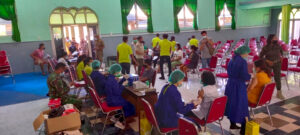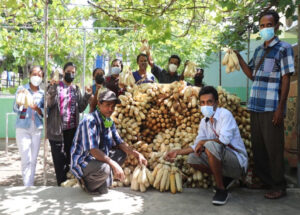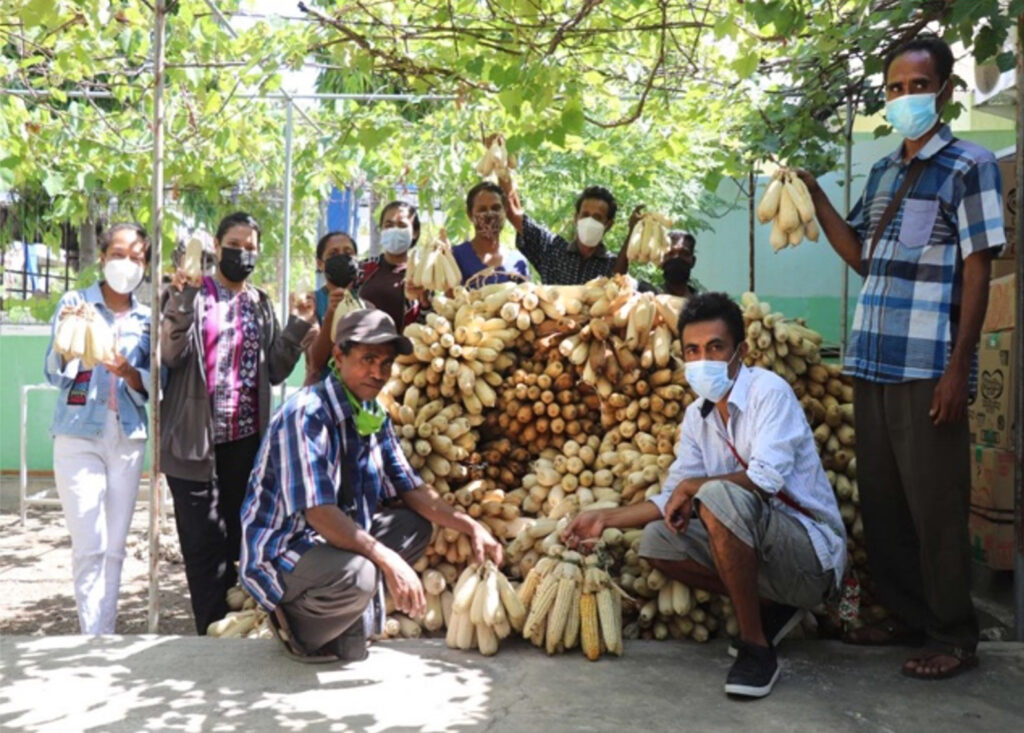The Stamina of Faith
Karen Campbell-Nelson serves with the Evangelical Christian Church of West Timor in Indonesia.
This is a story about how my church in Timor, the Evangelical Christian Church of Timor (GMIT) keeps on keeping on. GMIT prides itself on developing thoughtful programs at the synod, presbytery, and congregational levels that are informed by contextual developments supported by data. However, a triple whammy of disasters (Covid Spike 1, Seroja Cyclone, Covid Spike 2) seems to laugh in the face of such planning. The disasters have revealed that adaptability and resiliency can be just as important as careful planning. Yet resistance to setting aside best-laid, data-informed plans can add to the stress already caused by non-stop disasters and present a challenge to how the church responds with faith to disasters.

In 2020, GMIT’s Synod made concerted efforts to address the many aspects of being church in the midst of a pandemic. The decisions of its 2019 quadrennial and 2020 annual assemblies were put on hold as a special task force sought to serve while many in the church grieved the death of beloved pastors, friends, and family members. Having endured the initial wave of the virus, and with vaccinations slowly rolling out across Indonesia, GMIT held its second post-quadrennial assembly in mid-March 2021. Yet even before a month had passed, large areas served by GMIT were hit hard by the Seroja Cyclone of April 4-5, a cyclone triggered, in part, by rising ocean temperatures—a sign of creation’s balance further askew. The Synod Executive Council formed yet another emergency task force—the Seroja Cyclone Response Team—and annual programs were once again set aside. This time, however, the pressure to honor assembly decisions, which certainly did not include responding to a cyclone, began to be felt. Synod staff not only had to implement an emergency response to the nearly 75% of GMIT’s presbyteries (38/52) that suffered from the cyclone’s impact but also were expected to keep their “regular” Synod programs afloat. An unintended competition emerged where Synod staff had to juggle two different agendas under one umbrella as congregations and presbyteries not affected by the cyclone continued to request Synod’s attention and accompaniment.
GMIT has benefited well from access to professional disaster response organizations that have offered support, yet has neither the resources nor readily-available personnel to sustain the level of full-time disaster response still needed by so many of its congregations. A number of Synod staff will deny that they struggle to maintain their balance by keeping one foot under the disaster response tent and the other in the Synod office, but I observe the balancing act. I simultaneously marvel at the dedication of so many wonderful pastors and volunteers while I also experience great sadness at those who withhold support of adaptability and regard the untiring efforts of the disaster response team with suspicion. Even as many of my colleagues have managed to keep their balance in terms of work and emotional well-being, GMIT now faces a second, more serious wave of Covid infections as new variants sweep across Indonesia. A June 25, 2021, New York Times article indicates that certain vaccines, such as Sinovac, the main one issued in many areas of Indonesia, may not be very effective in preventing infections caused by new variants. The article reports that at least 20 of the 401 Indonesian doctors who have died because of Covid were fully vaccinated. This information is supported by local cases of individuals we know who have been vaccinated and who are getting sick with the virus. This sobering reality continues to challenge GMIT’s self-understanding as a church that seeks to be responsive to local contexts yet faces an identity crisis when the understanding of “being church” first and foremost as physical encounters in prescribed social spaces, is threatened.

Photo courtesy of Rev. Wanto Menda, May
19, 202
Sustained lockdowns don’t really work here, not only due to social-cultural habits that are difficult to break but also because of individual and structural poverty. A large number of GMIT’s members need daily wages in order to survive, which makes the poorest people also the most vulnerable to the virus. Many also live in areas with a weak or non-existent Internet signal or do not really have a choice about whether or not to use meager cash resources to purchase the data needed for online access to school or worship.
Against all odds, marked by ongoing disasters, GMIT’s witness to a deep faith and hope persists. So far, the GMIT Synod Executive Council continues to issue pastoral guidance and seeks to model strict health protocols, but it is difficult. Should cases continue to expand in our province, this position may change quickly. But GMIT is not alone and finds both solace and inspiration from partners in its community of faith, such as the PGI, Communion of Churches in Indonesia. Take, for example, a recent WhatsApp message by the PGI Moderator. It was written at the end of July from Jakarta where oxygen is in critically short supply and hospitals are reeling from the vast numbers of people falling ill, including medical personnel (meaning a reduction in first responders available to treat others). Rev. Gultom’s (translated) message reads:
Good evening, everyone.
In this increasingly worrisome pandemic condition, along with limited hospital beds and medical personnel at this moment, church leaders probably need to think about providing shelter for self-isolation. I imagine that three-four congregations close to each other (they need not be from the same synod/denomination) could organize one shelter. We of the PGI Executive Council have offered to the [National] Covid Taskforce to convert floors 2–4 of Graha Oikoumene [“Ecumenical House” is the site of PGI’s office in Central Jakarta] for use as an emergency hospital if needed and meets necessary prerequisites. If this plan is implemented, the [PGI] Secretariat may temporarily work from home.
Rev. Gultom encouraged ecumenical relations to take on new meaning through immediate action, and his response to the current Covid surge is presented as the fulfillment of a basic human right that cannot be divorced from a Christian mission. His message also assumes that we have a future to create and live towards, to cherish, and love. This hope is a testimony to God’s presence with us. Centuries before the Christian Era, the writer of Proverbs said it well—age-old wisdom indeed: Surely there is a future, and your hope will not be cut off (Proverbs 23.18). Surely there is. Wherever we may find ourselves around the globe, may we join together, again and again, to strengthen our faith, revel in its stamina, and rest on its assurance that God is with us, no matter what, now and in the future.
Karen Campbell-Nelson serves with the Evangelical Christian Church of West Timor in Indonesia. Her appointment is made possible by your gifts to Disciples Mission Fund, Our Church’s Wider Mission, OGHS, and your special gifts.

